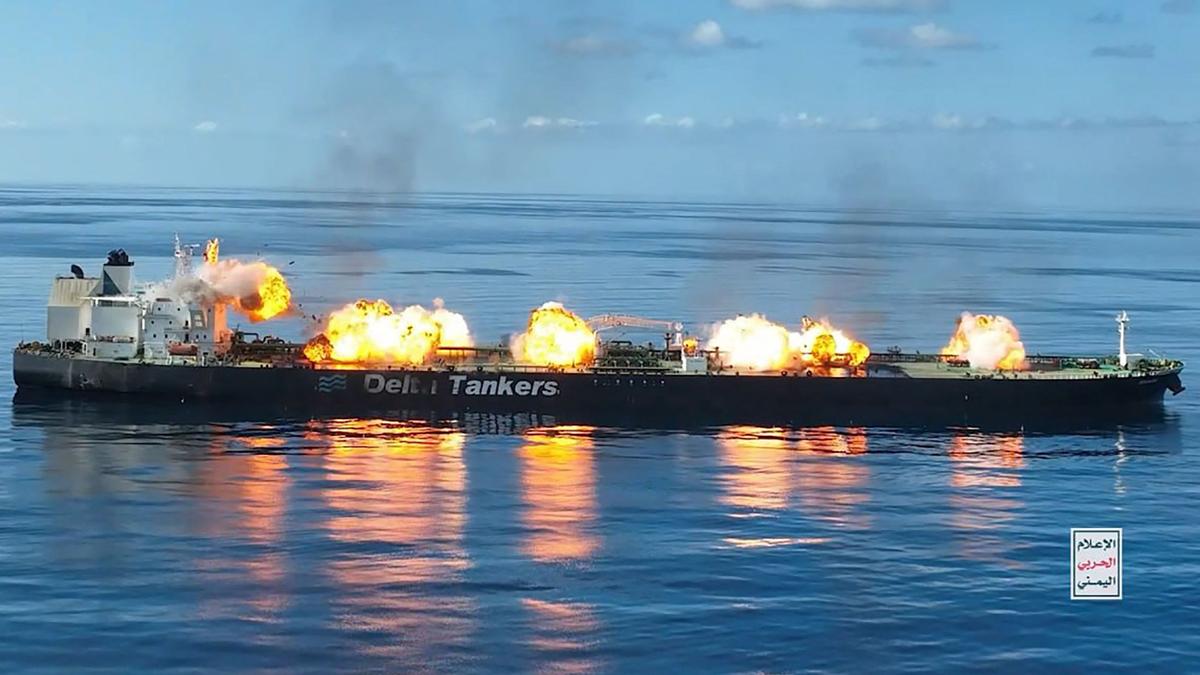The recent attacks on a merchant ship in the Gulf of Aden highlight the escalating tensions in the region and the Houthi rebels’ growing assertiveness in targeting international shipping. These attacks, which the Houthis claim are in solidarity with Palestinians, are part of a broader campaign aimed at disrupting crucial maritime routes. This article will delve into the key aspects of these attacks, examining the Houthi motives, the potential impact on global trade, and the ongoing response from international forces.
Houthi Motives: Solidarity or Strategic Advantage?
The Houthis have explicitly linked their attacks on shipping to the conflict in Gaza, claiming it is a show of solidarity with the Palestinians. However, these attacks also serve broader strategic interests for the rebel group. By disrupting maritime traffic, the Houthis aim to:
Disrupting the Economic Lifeline
The Gulf of Aden is a critical shipping route, connecting Asia, Europe, and Africa. By targeting vessels in this waterway, the Houthis disrupt the flow of goods, potentially impacting global supply chains and economic activity. This can put pressure on regional economies and international businesses reliant on this trade route.
Projecting Power and Influence
These attacks demonstrate the Houthis’ capability to project power beyond their control in Yemen. By disrupting crucial trade routes and striking fear in the hearts of maritime operators, the group seeks to showcase their military capabilities and assert their influence in the region.
Pressuring International Intervention
The Houthis may hope that these attacks will push the international community towards a more assertive stance against their allies, such as Iran, or potentially even force international negotiations that could benefit their interests. This strategy hinges on escalating tensions and creating a perceived threat that requires an international response.
Impact on Global Trade and Security
The attacks by the Houthis have had a significant impact on the global trade landscape.
Disruption of Trade Flows
The Gulf of Aden, as a key shipping route, is crucial for transporting a wide range of goods. Attacks on vessels in this region have the potential to significantly disrupt these flows, leading to:
- Higher shipping costs: Increased risk to vessels in the region leads to higher insurance premiums, impacting the overall cost of transporting goods.
- Supply chain delays: The disruption to maritime traffic can create delays in the delivery of goods, impacting both producers and consumers.
- Increased food insecurity: These disruptions can affect the delivery of food and essential supplies to various regions, impacting food security and contributing to potential economic hardship.
Escalating Regional Tensions
The Houthi attacks not only impact trade but also contribute to escalating regional tensions. This is particularly concerning given the complex dynamics between the Houthis, their allies in Iran, and regional powers such as Saudi Arabia. The risk of retaliation and further escalation of violence poses a significant threat to regional stability.
Security Concerns
The Houthi attacks raise security concerns for maritime operators and the international community. These attacks necessitate enhanced security measures, including:
- Increased naval patrols: International maritime forces have deployed more warships in the region to patrol key shipping lanes and deter attacks.
- Enhanced vessel security: Merchant ships are implementing heightened security measures, such as using armed guards and adopting defensive tactics.
- Information sharing: International maritime agencies and governments are coordinating information sharing to better monitor shipping routes and respond to threats.
The International Response
The international community has reacted to the Houthi attacks with a combination of condemnation, diplomatic efforts, and military action.
Condemnation and Diplomatic Efforts
The attacks have been met with strong condemnation from several countries and international organizations. The United States, the United Kingdom, and the United Nations have called on the Houthis to cease their attacks and engage in peaceful negotiations. These efforts also seek to put pressure on the Houthis to adhere to international norms and to de-escalate tensions.
Naval Response
International navies have been deployed to the region in a bid to deter further attacks and protect vessels. These include:
- UKMTO: The United Kingdom Maritime Trade Operations agency, run by Britain’s Royal Navy, has been actively engaged in monitoring shipping routes and responding to security threats.
- JMIC: The Joint Maritime Information Centre, run by a Western naval coalition, plays a key role in sharing information and coordinating responses to threats in the region.
- USCENTCOM: The U.S. Central Command has stated that it has taken military action, destroying Houthi drones and uncrewed surface vessels that it claims posed a threat to its forces.
Diplomatic Solutions
While condemnation and military action are essential responses, international efforts also focus on:
- Political Negotiations: Pushing for political negotiations to resolve the ongoing conflict in Yemen, aiming to de-escalate tensions and find a long-term solution to the conflict.
- Sanctions: Considering additional sanctions against the Houthis and their supporters to pressure them to change their course of action.
- Aid to Yemen: Continuing to provide humanitarian aid to Yemen, aiming to alleviate the humanitarian crisis exacerbated by the ongoing conflict.
Takeaway Points
The recent attacks by the Houthis on merchant ships in the Gulf of Aden highlight a dangerous escalation in the conflict in Yemen and pose a significant threat to global trade and security. Here are some key takeaways:
- The Houthis’ actions demonstrate a willingness to escalate their conflict with international actors and target global economic interests.
- These attacks highlight the vulnerabilities of vital shipping routes and the potential for significant disruptions to global trade.
- The international community’s response to these attacks will be crucial in deterring further violence and pushing towards a peaceful resolution to the Yemen conflict.
- The threat to global trade, security, and regional stability demands a comprehensive approach that combines diplomatic efforts, naval responses, and humanitarian support to find a lasting solution.









